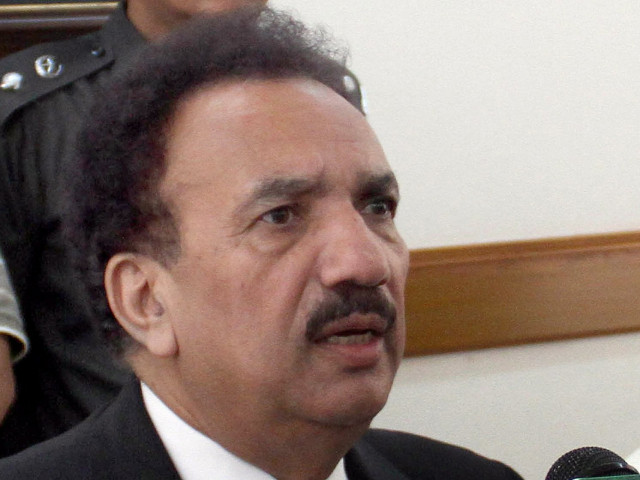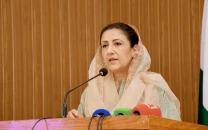WikiLeaks episode III: ‘Britain, US pressing MQM to oppose NRO’
Rehman Malik felt establishment, Saudi Arabia were working to oust Zardari.

In a meeting held on November 9, 2009, Malik claimed to then US ambassador to Pakistan Anne Patterson that the “MQM had repeatedly stated that both the US and the UK had urged the party to oppose the National Reconciliation Ordinance (NRO) – a move that led the government to withdraw the legislation from parliamentary consideration and placed the future of Zardari at risk.”
Malik also claimed that the MQM had said that it “had received this message during the Sindh governor’s recent trip to the US and that Altaf Hussain had been approached by the UK govt in London.” Patterson denied that the US had spoken to the Sindh governor.
Malik’s motive to meet Patterson was to request that the US issue a strong statement supporting democracy in Pakistan. Patterson commented in the memo that Malik was worried that “Zardari and his inner circle of advisers had lost the support of the international community.”
Malik also claimed that the ‘establishment’ was involved in working against the NRO and for Zardari’s exit. However, while the MQM had told Malik that the military was involved, the interior minister did not believe that Chief of Army Staff (COAS) General Kayani was ‘involved in the plotting’.
According to a leaked memo, Kayani, however, had told Patterson in March 2009 that he may have to urge Zardari to resign if conditions deteriorated. The memo also said that Kayani had hinted at ‘disquiet among his corps commanders who believe Zardari is corrupt and has not been paying enough attention to Pakistan’s economic and security challenges.’
The ambassador recounting her meeting with Malik noted that his belief that “ISI Director General (DG) Lt-Gen Ahmad Shuja Pasha was unilaterally behind the push to oust Zardari” and Kayani was not involved was “either naive or intentionally misleading”.
Patterson wrote that it would be “impossible for Pasha to move without Kayani’s acquiescence.” Pasha had also spoken to Patterson in early 2009 about his concerns over Zardari.
Rehman Malik suggested in the meeting that the way to deal with military pressure would be for Zardari to make changes in the military hierarchy. Malik, in the memo notes, “proposed that Zardari recreate the deputy chief of army staff position and move Pasha into that position in March 2010. Zardari could then elevate Pasha to COAS in Oct 2010 on the expiration of Kayani’s term. Malik suggested that Kayani could then be made chairman of the joint staff.”
However, the move did not go ahead. Kayani’s term as chief of army staff was extended this July for three more years. Pasha’s term as DG ISI was extended for a year in March 2010.
The interior minister also believed that Saudi Arabia was ‘working to unseat Zardari’.
Saudi Arabia’s dislike of Zardari has been documented in several cables by WikiLeaks revealing several reasons – Saudi Arabia feared a ‘Shia triangle’ in the region and Zardari’s relationship with Iran.
Malik also claimed the MQM was meeting with the PML – N and Sharif was “pressuring CJ [of Pakistan (CJP)] Iftikhar [Muhammad] Chaudhry to disqualify Zardari.”
Malik also said that the NRO expiry would not affect Zardari, and that the CJP would not revoke Zardari’s presidential immunity. Malik claimed that if the CJP did so, “the interior minister can instruct prosecutors to dismiss charges in any court case.” Patterson noted, “Malik’s views on Zardari’s legal troubles presuppose that CJP Iftikhar Chaudhry will be bound by normal interpretations of the law and precedent. Such an assumption ignores Chaudhry’s penchant for ignoring both in recent rulings and his personal animosity towards Zardari.”
Published in The Express Tribune, December 4th, 2010.



















COMMENTS
Comments are moderated and generally will be posted if they are on-topic and not abusive.
For more information, please see our Comments FAQ